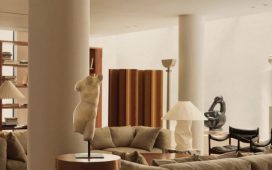[ad_1]
In October and November 2017, the American writer Sala Elise Patterson and I travelled to the Low Country in Georgia. In recent years, politics has forced people to be polarised, but we figured that there would be a lot more contradictions, even in somewhere like rural Georgia, a place that was probably leaning Republican. We set out to interview people from both sides of the political tracks, and look for continuities, and the paradoxes of everyday life.
The Low Country is sprawling swamp land along the Ogeechee River, or Blackwater River as it is known. We spent months researching beforehand. One of the places we reached out to was St Bartholomew’s Episcopal Church in the hamlet of Burroughs. St Bartholomew’s is the last standing chapel of the Ogeechee River Mission and the oldest African American congregation in the Episcopal Diocese of Georgia. The chapel was built by enslaved people in 1896.
We went to the church after the service one Sunday afternoon. It was early autumn, things were beginning to change. The priest, Father Willoughby, and three women had agreed to speak with us. I usually work on my own. Working with a writer here gave me the opportunity to disappear into the background. On projects like this, I try to observe and understand, and allow the viewer to do so, too.
I had been listening to Vernia Lanson talk to Sala for about half an hour before I took this shot. It wasn’t posed. I’m not even sure she was aware I had taken it. We had done a few photos earlier, but they weren’t really working. She was quite shy and nervous, and I went outside and photographed the garden. When I came back in, she was sitting there, and I sat and watched her for a while.
The filtered golden swamp light made the image feel like an old tapestry or a master’s painting. You can’t plan for moments like this. They just emerge and you think: “Wow, that is exactly the temperature of that moment.” The best you can do is not over-shoot it, not overcrowd the moment.
Vernia was soft-spoken, calm and very generous. She had wonderful eye contact. She was obviously very keen for that church to be maintained, partly because the memories of her ancestors were important but also because church is huge in the south. You’re almost taken aback by the warmth of the people there.
She spoke about how the sense of community they had felt for 50, 60 years was being slowly eroded. An area that had been a hotbed for fishing and local commerce was now all empty towns. Because the rivers are empty, the money is centralising in the city.
When Sala and I started working together, we were drawn to domestic issues – inequality, gun violence, human stories. But we slowly drifted more towards the landscape. Both metaphorically and on a day-to-day level, the collapse of nature around that area was affecting what was happening at a community level. It’s all intertwined. What was ironic was that a lot of the pro-gun guys we spoke to are very big climate-change believers, because they hunt and have a first-hand understanding of how nature is changing.
I very much followed Sala’s lead. Listening to how she felt about being an American at this time resonated somewhat with how I feel as a Scottish man in terms of Brexit and independence and the fractured political state of the UK. If there was any takeaway from the US election in 2016, it was that Hillary Clinton’s depiction of people on the other side of the political aisle as “deplorables” was a big mistake. It removed empathy and left no space for nuance.
My publisher calls these images anti-portraits. They’re not telling you how to feel about someone. They’re quiet, almost abstract. Underlying many of the issues is a certain paralysis regarding the history [of the area]. It is haunted by its past. There are still Confederate flags stuck on bumper stickers everywhere. People are still holding on to something that was.
I came away with a sense of a slow deterioration of things on a domestic level, in terms of industry, money, jobs and, most importantly, the climate. Throughout Blackwater River. the book Sala and I made about our trip, there are hurricane-ravaged landscapes, dry river beds, fishing communities closing up. Climate change is such a universal issue. It transcends all of our narratives.
Robbie Lawrence’s CV

Born: Edinburgh, 1988.
Training: English literature at University of St Andrews, Scotland.
Influences: “I grew up painting and drawing, so I am intrinsically drawn to references from those early years. I always loved the fauvists, particularly Derain.”
High point/low point: “Every project or photoshoot throws up both. The moment a successful photo is made is often the most satisfactory.”
Top tip: “Be vulnerable. I’m quite shy, so breaking down those internal barriers has been important.”
• Blackwater River by Robbie Lawrence is published by Setanta Books.
[ad_2]
READ SOURCE


